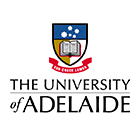Honours Degree of Bachelor of Science (Advanced)
Honours Degree of Bachelor of Science (Advanced)
Be a visionary science leader Like the Bachelor of Science (Honours), our direct-entry Bachelor of Science (Advanced)(Honours) is ideal if you haven’t yet chosen an area of science to specialise in, but—once you have—want to follow that path well beyond step one. The program again builds on South Australia’s highest-ranked…
Categories
COURSE DESCRIPTION
Be a visionary science leader
Like the Bachelor of Science (Honours), our direct-entry Bachelor of Science (Advanced)(Honours) is ideal if you haven’t yet chosen an area of science to specialise in, but—once you have—want to follow that path well beyond step one.
The program again builds on South Australia’s highest-ranked undergraduate Science degree*, and lets you explore your scientific curiosity before specialising. But at every stage you’ll be challenged by even greater academic demands. Ultimately, you’ll emerge as a clear future leader in your field.
What will you do?
Your first year is all about discovery. You’ll investigate a number of scientific fields, before choosing a major to focus on in years two and three (see Bachelor of Science (Advanced) for choices).
During this time you’ll enjoy the same fantastic opportunities offered to all Bachelor of Science (Advanced) students. That includes developing advanced research skills, making real-world connections through internships, and potentially gaining global experience with international study. In your honours year, you’ll then advance along either a disciplinary research or professional skills pathway.
The disciplinary research path is the most research-intensive. Working with a specific researcher or research group, you’ll undertake a major research project, together with advanced coursework, in one of the following study areas:
- agriculture
- animal science
- chemistry
- ecology / environmental science
- environmental geoscience
- evolution and palaeobiology
- food and nutrition
- geology
- geophysics
- horticulture
- molecular and biomedical science
- physics
- plant science
- soil science
- viticulture
- wine science.
The less research-intensive professional skills path will expand your scientific knowledge and skills more broadly. You’ll undertake a major industry or community-related project, along with advanced general coursework, in your choice of:
- science communication
- science education
- science innovation
- science policy
- project management.
Where could it take you?
Depending on your study choices, you could emerge well-prepared for senior and leadership roles in a specific scientific discipline or as a science generalist, in the public or private sector. Or perhaps you’ll aim higher still and go on to master’s-level research. Wherever you want to go, you’ll be perfectly placed.
*QILT 2017 Science and Mathematics.
EDUCATIONAL INSTITUTION
The University of Adelaide unites and serves those striving to change the world—and themselves—for the better. It’s a place where history is made.Established in 1874, we’re home to over 29,000 students and 3,000 staff, all striving to create progress. For our community. For all. This is a university of outstanding quality—ranked as a top 100 global university—in the heart of the city of Adelaide.We were our country’s first university to welcome female students. The first to teach science and business. Our alumni have won Nobel Prizes, led the nation, and walked in space.




